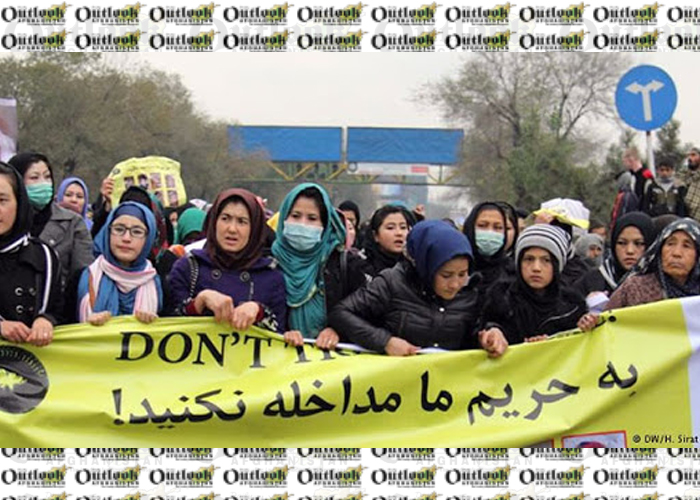Afghan women have been particularly concerned about the outcome of peace talks and the return of the Taliban. The rights and freedoms of women have made the national and international headlines. Women fear being marginalized socially and politically in the future political structure, once charted with the participation of the Taliban leaders, who still exercise fundamental ideology, after the Afghan government and the Taliban reach a peace agreement.
Three women Habiba Sarabi, Fawzia Koofi and Sharifa Zurmati, who are members of the Islamic Republic of Afghan negotiations team, said in an op-ed co-authored in CNN that “peace must not come at the cost of the rights of Afghan women, who have gained so much in recent years.”
They reiterated that Afghan women made unprecedented progress toward democracy and human rights, the risk that an Afghan woman will die in childbirth has diminished, the life expectancy of an average Afghan woman increased by about 10 years, and the percentage of Afghan girls who attend secondary school has grown more than six-fold.
It is self-explanatory that as a result of making sacrifices for promoting human rights and democratic discourse, Afghan women made great strides within the last couple of decades notwithstanding the serious threats and violence as well as formidable challenges, which could create obstacles to their progress.
Afghan women have active participation in social and political issues and their role is highly prominent. They serve in police rank and military forces despite the life-threatening dangers. They save lives in hospitals as doctors and nurses, educate the younger generation in schools, universities and educational centers, serve as mayors and governors, etc. They also serve as human rights advocates, civil society activists, and journalists.
To view the ongoing threats and challenges before women, I believe that Afghan women are the bravest women on the surface of the earth.
Fawzia Koofi participated in intra-Afghan dialogue in Doha, Qatar’s capital, with her arm folded as she survived an assassination few days before her trip there.
The United Nations Assistance Mission in Afghanistan reported, which was also cited by the three, “2020 marked the highest number of women killed in the country in a single year since the UNAMA began systematic documentation in 2009.”
Three hundred ninety women were reportedly killed, a 13 percent increase last year in the wake of targeted killings and the use of improvised explosive devices. Female journalists, activists, and judges are still highly vulnerable as many lost their lives. Pointing to the targeted killings of female judges and journalists, the three negotiators said that “such violent acts will not silence the voices of women who long for stability and freedom in all regions of the world.
They merely deepen our resolve to unite and preserve hard-won progress.” Additionally, they called on regional and global stakeholders, including Iran, Pakistan, China, Russia, the European Union and the United States, to push both the Afghan government and the Taliban to reserve at least 30 percent of elected seats and appointments for women in the government and include them in the agenda of the upcoming Istanbul conference.
Overall, Afghan women made great strides on the long road and paid heavy sacrifices as a result of violence and conflict in the past two decades.
They will not backtrack. Their rights and liberties must not be compromised at the negotiating table. Women make half of the population and have to be included in all social, cultural, economic, and political arenas. In other words, sidelining women from the social and political sectors simply for their gender is not acceptable at all.
Gender discrimination has no room in the Afghan Constitution or international instruments and should no more be practiced in the society.
Sustainable peace will emerge if, in addition to other preconditions, women are entitled equally with men and gender discrimination is eliminated from all layers of the society. To form a civil society void of violence and bloodshed, women have to be the integral element in all walks of social and political life. In short, discriminating women on the grounds of their gender has no justification and will slow down the process of civilization and democratization in the society.
The Afghan government and political leaders, the United Nations, and regional and global actors, including the European Union and the United States, have to advocate the rights and freedoms of women in the peace process and future political structure. The democratic gains, non-discriminatory principle, and equal rights and freedoms of men and women need to be preserved.
Home » Opinion » Women Call For Preservation of Their Rights and Freedoms
Women Call For Preservation of Their Rights and Freedoms
| Hujjatullah Zia

